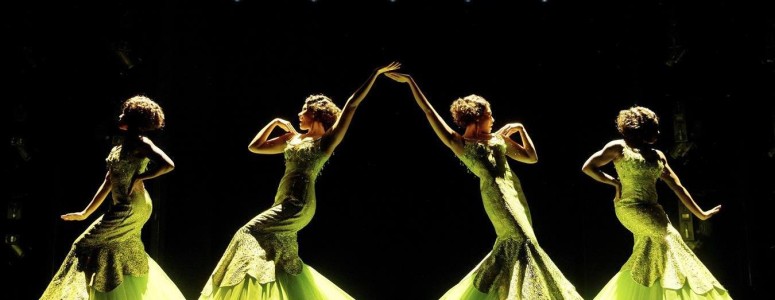An apologetic Curtis Taylor, Jr.?
In every production of DREAMGIRLS that I’ve seen, when Curtis must tell his girlfriend Effie Melody White that she’ll now be singing backup in the newly renamed Dreams, he’s delivered the information as a matter-of-fact, no-big-deal afterthought.
His unemotional tone underlines what the ensemble sings: “Show-biz; it’s just show-biz.” Curtis is putting career success before love — if indeed Curtis ever had that feeling for Effie, as he’d previously alleged or at least had led her to believe.
Perhaps Curtis did love Effie; someone who didn’t might have replaced the portly miss from The Dreams right then and there.
That would, however, have made for a much shorter first act. And DREAMGIRLS is one of the few musicals that earns its two hours and 40-minute running time.
Here in London, where British theatergoers have been waiting for more than 35 years to see the acclaimed almost-Tony-winning musical by bookwriter-lyricist Tom Eyen, composer Henry Krieger — and, oh, yes: director-choreographer Michael Bennett – Joe Aaron Reid hesitates before telling Effie the news that he knows will devastate and infuriate her. He’s not afraid to deliver the bad news, mind you; he simply seems genuinely sorry that he must do what he has to do.
That’s the difference between director-choreographer Casey Nicholaw and Michael Bennett. The latter reveled in the fact that show business is unfeelingly merciless. Remember that in his A CHORUS LINE, Bennett had Zach near the end of the show call out the names of eight aspirants, tell them to step forward, which made them assume that he’d selected them — only to then reveal that he had eliminated them. Talk about Theatre of Cruelty!
In contrast, Nicholaw enjoys a reputation on Broadway as a genuinely good guy. Thus, he may have felt that we needed to like Curtis at least for a little while longer. As the show continues, the car-salesman-turned-impresario does turn out to be quite the skunk. Reid expertly makes that adjustment.
Nicholaw has made Effie a little nicer, too. Perhaps he agrees with some critics and theatergoers that the diva shouldn’t be so egocentric and should at least make an effort to become a team player. (Bennett’s success-at-any-cost worldview may be the reason her intractability stayed in the show.) By the end of the beautiful song “Family” (sung admirably by Tyrone Huntley as Effie’s brother C.C.), Amber Riley seems more resigned to the situation than other Effie’s have been. It’s a better choice.
In one of their first engagements as a reconfigured group, Bennett had Effie telegraph to the audience that she had the most talent and strongest voice by blaring out the one solo line she had in the song. Nicholaw chooses to have Riley sing a bit loudly, but not nearly as notice-me pathetic as Jennifer Holliday and her successors did. Riley once again gives the impression that Effie is at least trying to accommodate the new directive. This too is a better choice.
In conjunction with making Effie slightly more accommodating, Nicholaw has made Liisi LaFontaine’s Deena a bit stronger from the outset. That’s wise, too, because she will soon have to bear the burden of being the group’s leader. Early on we need to see that she can handle it; LaFontaine convinces us.
Huntley’s C.C. seems tougher, too. When he tells Effie “Stop bringing us down!” – after his sister’s acquiescence has run dry — he says it with the authority of an employer and not the tenderness of a brother. We can see that he still loves her, but he feels that the punishment must fit the many crimes.
By the time DREAMGIRLS debuted, we’d assumed we’d seen that last of those secondary romantic subplots: Carrie and Mr. Snow, Hinesy and Gladys, Kim and Hugo, Lun Tha and Tuptim, et cetera, et cetera, et cetera. Eyen, Bennett and Krieger weren’t afraid of reviving the practice as Lorrell, one of The Dreams, becomes involved with fading superstar James Thunder Early. Asmeret Ghebremichael matches Adam J. Bernard’s fire as both of them fan the flames of the conflict.
There is one profound disappointment. How well I remember sitting in a loge seat during the 1981 Boston tryout, seeing The Dreams perform before a tinseled curtain, then disappear behind it and emerge only split-seconds later as the announcer told us they were now in a new city. I immediately thought “Something’s different,” but I needed an extra second, as did the audience, to realize precisely what it was. In that infinitesimal amount of time, The Dreams had changed their outfits. The “Oooooh!” from me and the thousand-plus theatergoers still rings in my ears.
You won’t hear or see this in London. Nicholaw doesn’t try this, so whatever we have to say about Bennett’s character, let give him credit for extra-showmanship.
Of course, any DREAMGIRLS is going to be judged by the dynamic song that ends the first act – the greatest Act One closer in musical theater history. (Sorry, Merman, Styne and Sondheim.) Riley gets all the juice out of “And I Am Telling You, I’m Not Going.” Of the eight productions of DREAMGIRLS that I’ve seen dating back to the original (as well as the film), Riley convinced me more than any of the other Effies that she was alternating her fighting for Curtis just as much as she was for staying in the group.
Effie may think that she’s not going, but Amber Riley makes certain that everyone in the house is indeed going – crazy, that is, for what she accomplishes there and for the rest of the night, too.




